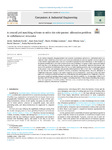A centralized matching scheme to solve the role-partner allocation problem in collaborative networks

Use este enlace para citar
http://hdl.handle.net/2183/32934
A non ser que se indique outra cousa, a licenza do ítem descríbese como Atribución-NoComercial-SinDerivadas 3.0 España
Coleccións
- Investigación (FIC) [1654]
Metadatos
Mostrar o rexistro completo do ítemTítulo
A centralized matching scheme to solve the role-partner allocation problem in collaborative networksAutor(es)
Data
2022-07Cita bibliográfica
J. Andrade-Garda, J. Ares-Casal, M. Hidalgo-Lorenzo, J. Lara, D. Lizcano & S. Suárez-Garaboa, "A centralized matching scheme to solve the role-partner allocation problem in collaborative networks", Computers & Industrial Engineering, vol. 169, July 2022. doi: 10.1016/j.cie.2022.108244
Resumo
[Abstract]: In the current constantly changing business and economic environment, partners (i.e., individuals and/or enterprises) create Collaborative Networks to join efforts and undertake new projects together, thus allowing them to face business opportunities that would not be possible if attempted by them individually. In this situation, an assignment problem arises, since these projects involve the performance of a group of tasks or processes (named roles) that have to be distributed among the partners. Specifically, this problem, called the Role-Partner Allocation (RPA) problem in Collaborative Networks is a two-sided matching problem with lower and upper quotas on the partner’s side, and incomplete and partially ordered preference lists on both sides. A matching problem, and thus also the RPA problem, should be solved by a centralized matching scheme. However, allocations in Collaborative Networks continue to be mainly created by ad hoc arrangements, which takes a long time and is hard work. Looking for a reliable and faster way of distributing roles among partners in a Collaborative Network, the existing centralized matching schemes expected to solve the RPA problem (e.g., DA algorithm, SOSM, CA-QL algorithm, and EADAM) are studied in this paper, concluding that none of them obtain a matching that properly meets the requirement of the RPA problem. Therefore, a new centralized matching scheme to solve the RPA problem is proposed, discussed and exemplified.
Palabras chave
Centralized matching scheme
Collaborative network
Matching problem
Partner
Role
Collaborative network
Matching problem
Partner
Role
Descrición
Financiado para publicación en acceso aberto: Universidade da Coruña/CISUG
Versión do editor
Dereitos
Atribución-NoComercial-SinDerivadas 3.0 España






